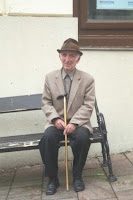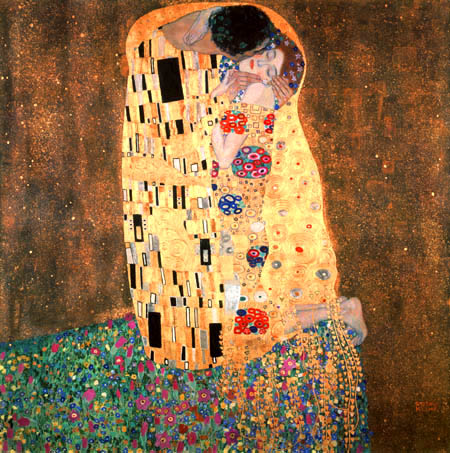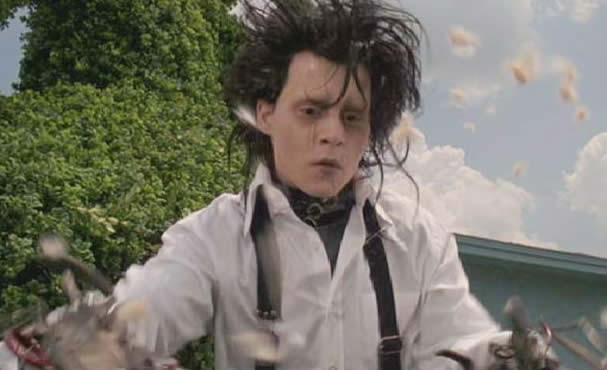
It could be that "Hot Baked Alaska," "the naughty librarian" could be something even Chesterton could accept? I'm sure he would have even better nicknames...

"My superiors were not happy. The local bishop was not happy, but they did not understand me either," Father Rungi told Reuters news agency from the town of Mondragone, near Naples.
"It was interpreted as more of a physical thing," he said. "Now, no one is saying that nuns can't be beautiful, but I was thinking about something more complete."

 (From a letter)
(From a letter)




 I was in Bardejo, a medieval town in Eastern Slovakia, we had a tour of the town. Our tour guide was an 87-year-old woman who had done her doctorate in history and had always had a particular interest in Bardejo. The tour was interpreted for me by Elizabeth Bennett. She was a darling women, wearing all black mourning clothes, with a handkerchief tucked in her sleeve, nylons, black sandals, and some excess concealer left on her nose and cheeks and the lapel of her blouse. She took us through the Cathedral--she knew what every sculpture was on every altar, she knew the name of all of the vaulting on the ceilings, she even knew where to find the ass of the architect of the city hall, who mooned the city in art since he wasn't paid sufficiently. We came to one altar in the cathedral. One of the four women figures had been stolen and subsequently replaced with a copy. She asked me which one. The answer seemed clear to me, so I immediately, self-assuredly pointed to the one that I t
I was in Bardejo, a medieval town in Eastern Slovakia, we had a tour of the town. Our tour guide was an 87-year-old woman who had done her doctorate in history and had always had a particular interest in Bardejo. The tour was interpreted for me by Elizabeth Bennett. She was a darling women, wearing all black mourning clothes, with a handkerchief tucked in her sleeve, nylons, black sandals, and some excess concealer left on her nose and cheeks and the lapel of her blouse. She took us through the Cathedral--she knew what every sculpture was on every altar, she knew the name of all of the vaulting on the ceilings, she even knew where to find the ass of the architect of the city hall, who mooned the city in art since he wasn't paid sufficiently. We came to one altar in the cathedral. One of the four women figures had been stolen and subsequently replaced with a copy. She asked me which one. The answer seemed clear to me, so I immediately, self-assuredly pointed to the one that I t hought it was, and she agreed. We continued with the tour.
hought it was, and she agreed. We continued with the tour.



 to see The Other Boleyn Girl for quite some time, but as I'm scared to death at the prospect of Sterns and I falling in love with the same person, it took a while for me to work up the courage. This movie actually did capture well some dynamics of the older sister/younger sister relationship. The younger sister surprisingly forgives the older sister all of her very malicious, calculating actions, even though they came between her and and the man she loves. The younger sister would do anything for the older sister to preserve the family relationship. Sterns, I hope you're still glad you didn't marry that boy when you were 14!
to see The Other Boleyn Girl for quite some time, but as I'm scared to death at the prospect of Sterns and I falling in love with the same person, it took a while for me to work up the courage. This movie actually did capture well some dynamics of the older sister/younger sister relationship. The younger sister surprisingly forgives the older sister all of her very malicious, calculating actions, even though they came between her and and the man she loves. The younger sister would do anything for the older sister to preserve the family relationship. Sterns, I hope you're still glad you didn't marry that boy when you were 14!
 I found to have very little merit at all, and I've been in a lot of weddings. I think that there was one funny line: "You can cut it off and wear it again." That is actually supremely funny. Also, the main boy in it is super cute in a not-the-same-as-every-hollywood-boy sort of way, which is another redeeming factor. The acting is some of the poorest and most awkward I've ever seen.
I found to have very little merit at all, and I've been in a lot of weddings. I think that there was one funny line: "You can cut it off and wear it again." That is actually supremely funny. Also, the main boy in it is super cute in a not-the-same-as-every-hollywood-boy sort of way, which is another redeeming factor. The acting is some of the poorest and most awkward I've ever seen. 